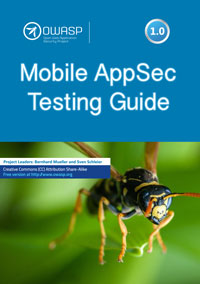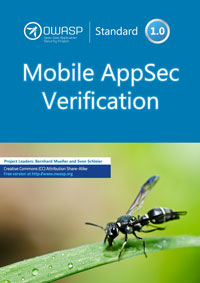This site is the archived OWASP Foundation Wiki and is no longer accepting Account Requests.
To view the new OWASP Foundation website, please visit https://owasp.org
OWASP Mobile Security Testing Guide
Our VisionCreate a comprehensive methodology that covers the processes, techniques, and tools used during a mobile app security test, and defines a complete set of test cases that enables testers to deliver consistent and complete results. At least, that was the initial vision. However, we soon discovered that we had to ask some deeper questions on what mobile app security is about: Without a reasonable definition a "secure" mobile app, there wasn't really anything to test against. We therefore went back to the drawing board and wrote the MASVS, a "mobile security standard" that defines the baseline security requirements. Main DocumentsWhere to DownloadThe MSTG is an a pre-release state and not yet ready for release. Currently, we aim for a first pre-release in Q1 2017. You can however access the existing content in the GitHub Repo. LicensingThe guide is licensed under the http://creativecommons.org/licenses/by-sa/3.0/ Creative Commons Attribution-ShareAlike 3.0 license], so you can copy, distribute and transmit the work, and you can adapt it, and use it commercially, but all provided that you attribute the work and if you alter, transform, or build upon this work, you may distribute the resulting work only under the same or similar license to this one. |
Classifications
Project Leaders
Project InitiatorsParent Project | |||||||
How can I participate in your project?
First of all, read the author's guide and decide in what for you would like to contribute. Then, contact the lead author responsible for the chapter you are interested in. You can find their name and GitHub handle in the [README https://github.com/OWASP/owasp-mstg/blob/master/README.md]. Please always check with the responsible person first, or you might end up working on a chapter that's already being done by someone else. In any case, we encourage you to join OWASP Mobile Security Project Slack Channel, where you'll find all the other project members. You can sign up for an account here:
The home of the OWASP Mobile Security Testing Guide is on GitHub. You are encourged to fork, edit and push your changes back to the project through git or edit the project directly on github.
If I am not a programmer can I participate in your project?
Yes, you can certainly participate in the project if you are not a programmer or technical. The project needs different skills and expertise and different times during its development. Currently, we are looking for researchers, writers, graphic designers, and a project administrator.
Contributors
The Mobile Security Testing Guide was initiated by Milan Singh Thakur in 2015. The original document was hosted on Google Drive. Guide development was moved to GitHub in October 2016. Below is the full list of contributors for each revision.
MSTG in its current form
Lead Authors:
- Stephen Corbiaux
- Bernhard Mueller
- Sven Schleier
- Francesco Stillavato
- Stefan Streichsbier
- Abdessamad Temmar
- Stephanie Vanroelen
- Gerhard Wagner
- Jeroen Willemsen
Contributors:
- Davide Cioccia
- Bao Le
- Shiv Patel
- Prathan Phongthiproek
- Abhinav Sejpal
- Anant Shrivastava
- Pragati Singh
- Milan Singh Thakur
- Blessen Thomas
- Dennis Titze
- Bernard Wagner
MSTG "Beta 2" on Google Drive
Authors:
- Mirza Ali
- Stephen Corbiaux
- Ryan Dewhurst
- Mohammad Hamed Dadpour
- David Fern
- Bao Lee
- Anto Joseph
- Nutan Kumar Panda
- Rahil Parikh
- Julian Schütte
- Abhinav Sejpal
- Anant Shrivastava
- Pragati Singh
- Milan Singh Thakur
- Stephanie Vanroelen
- Gerhard Wagner
Reviewers:
- Andrew Muller
- Jonathan Carter
- Stephanie Vanroelen
- Milan Singh Thakur
MSTG "Beta 1" on Google Drive
Authors:
- Mirza Ali
- Mohammad Hamed Dadpour
- David Fern
- Rahil Parikh
- Abhinav Sejpal
- Pragati Singh
- Milan Singh Thakur
Reviewers:
- Andrew Muller
- Jonathan Carter
Top Contributors:
- Jim Manico
- Yair Amit
- Amin Lalji
- OWASP Mobile Team
Q2 2017: Beta release Q3 2017: Version 1.0
A project roadmap is the envisioned plan for the project. The purpose of the roadmap is to help others understand where the project is going. It gives the community a chance to understand the context and the vision for the goal of the project. Additionally, if a project becomes inactive, or if the project is abandoned, a roadmap can help ensure a project can be adopted and continued under leadership.
As of November 2016, the priorities are:
- Finish the referencing for each principle.
- Update the Project Template.
- Use the OWASP Press to develop a book.
- Finish and publish the book on Lulu.
Involvement in the development and promotion of the OWASP Security Principles Project is actively encouraged! You do not have to be a security expert in order to contribute. Some of the ways you can help:
- Helping find references to some of the principles.
- Project administration support.
- Wiki editing support.
- Writing support for the book.
To be completed.




